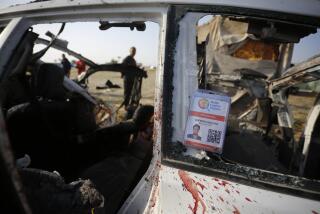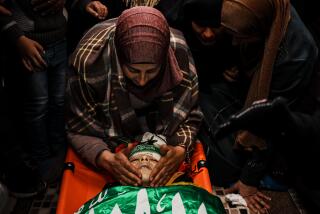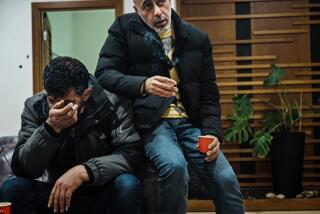Israeli rock band 9 Lives finds therapy onstage
TEL AVIV — Before the Israeli rock band 9 Lives takes the stage, its members gather for a rowdy group hug. They slap one another on the back, jump a few times in unison and gulp shots of arak, a popular anise-infused spirit.
The nine musicians have overcome crippling injuries and post-traumatic stress to arrive together at a popular Tel Aviv nightclub, where on this night they share billing with Israeli rock legend Ehud Banai.
“This band keeps me alive,” said 9 Lives vocalist Dekel Darchani, 37, who wears his black hair in a rockabilly pompadour.
The group occupies an unusual niche in Tel Aviv’s vibrant music scene: All of its members are Israeli military combat veterans who bear the scars of war.
Bassist Shlomi Gvili is missing several fingers, lead guitarist Ofer Hai Meyer lost an eye. The bandmates, who met five years ago through a nonprofit support group for veterans, grapple with trauma-related anxiety.
“It was hell,” said Darchani, who fought in Israel’s long-running conflict in Lebanon. “Bombs, shooting, screaming, evacuating your friends, evacuating their bodies. It was hell, on a daily basis.”
After being discharged in 1998, Darchani returned, depressed, to his parents’ home. Overcome with sadness, he was unable to keep a steady job.
“I couldn’t find myself,” he remembers. “My mom said, ‘You are not the same flower I sent to the army.’”
Eventually, Darchani found his way to Hope for Heroism, where he met rhythm guitarist Raz Hagag, 33, who broached the idea of a band.
The initial practice sessions were ragged — only a few of the members were experienced musicians — but they felt right, said Hagag, a former army medic on the Lebanese border. A heavy metal fan who grew up on Metallica and Guns N’ Roses, he said making music is easier than traditional therapy.
“You don’t have to talk so much,” he said. “You just have to play.”
The band’s style is bluesy, with reggae undertones. Members take turns writing songs. Some allude to war. Others tackle more universal themes, such as the struggle to find clarity in a fast-moving world.
They have performed in London and Los Angeles and are about to self-release their first CD. But Darchani, who now works days as a social coordinator at Hope for Heroism, said the band’s aim is healing, rather than scaling commercial heights.
“We succeeded a long time ago,” he said, noting that most band members are now employed and have wives and children. “All the rest is just a bonus.”
Still, in Israel, where most teenagers must join the military at age 18, the band has struck a chord. Its shows are usually packed. And among its most loyal fans are the families of soldiers killed in service.
At the Tel Aviv concert, Amos Hach, 28, sat with his mother and sisters at a small table near the stage. “Being here gives me goose bumps,” said Hach, whose brother, Tazachi, 19, was killed by a Lebanese sniper.
His sisters had brought a large bouquet of purple irises for the band and, in particular, Hagag, who had served in the same unit as Tazachi. They showed cellphone pictures of the two young men in military fatigues, posing in a dormitory.
As the band took the stage, any nerves were forgotten.
Darchani crooned with gusto. Fellow vocalist Matan Bnayahu, 36, a former paratrooper who was shot multiple times in the West Bank town of Hebron, hopped on an amplifier during a hard-rocking moment. Guitarist Meyer, 33, wailed on a white Gibson.
They played for more than an hour, dark songs interspersed with more upbeat ones. They weren’t perfect: For a while, one of the guitarists forgot to plug his instrument in.
But by the time Banai joined the band for a few songs, the crowd was ecstatic. Banai is a fan of 9 Lives, and concertgoers stood up, raising their phones to capture the moment.
Amos Hach put an arm around his mother and danced.
More to Read
Start your day right
Sign up for Essential California for news, features and recommendations from the L.A. Times and beyond in your inbox six days a week.
You may occasionally receive promotional content from the Los Angeles Times.







